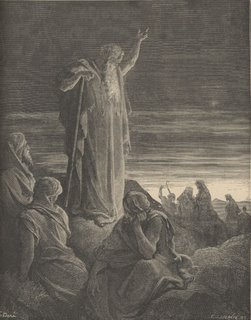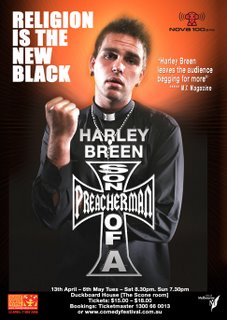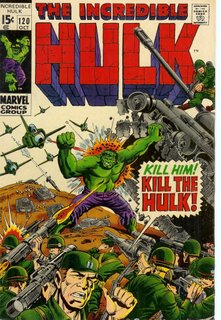You are
| You are intelligent, witty, a bit geeky and have great power and responsibility. |
A place to muse on theology, society, politics, history, arts, and culture (let's see did I miss anything?)
| You are intelligent, witty, a bit geeky and have great power and responsibility. |
 We have been discussing the gift of prophecy in our theology class and a couple of students have raised questions about my approach to the topic. It seem to me that there are some major problems with the contemporary expression of "prophetic utterances," “words of wisdom” and “words of knowledge.” They open up the potential for spiritual abuse and should be approached very cautiously in my opinion. All we need to know has been recorded for us in the Bible. No extra-biblical “prophecy” can ever add to this revelation so why is there a need for these so-called ”prophetic utterances”? If we believe God has some words of counsel to pass on to a fellow believer we should approach them as brother or sister and share it in a natural way, without any high sounding “thus saith the Lord” which claims an authority for ourselves that we do not possess.
We have been discussing the gift of prophecy in our theology class and a couple of students have raised questions about my approach to the topic. It seem to me that there are some major problems with the contemporary expression of "prophetic utterances," “words of wisdom” and “words of knowledge.” They open up the potential for spiritual abuse and should be approached very cautiously in my opinion. All we need to know has been recorded for us in the Bible. No extra-biblical “prophecy” can ever add to this revelation so why is there a need for these so-called ”prophetic utterances”? If we believe God has some words of counsel to pass on to a fellow believer we should approach them as brother or sister and share it in a natural way, without any high sounding “thus saith the Lord” which claims an authority for ourselves that we do not possess. At Ludicrousity's request, here are some photos from my recent graduation at La Trobe University. My thesis was formally finalised in October of last year (after being submitted as far back as March!) but I had to wait until now to shake the Chancellor's hand and get my testamur. (The crimson rosella is known for its bright plumage.)
At Ludicrousity's request, here are some photos from my recent graduation at La Trobe University. My thesis was formally finalised in October of last year (after being submitted as far back as March!) but I had to wait until now to shake the Chancellor's hand and get my testamur. (The crimson rosella is known for its bright plumage.)

 The Boy Wonder and I went along to see Harley Breen's one man show Son of a Preacher Man in Flinders Lane last Tuesday night. It was crude, rude, irreverent...and very funny. It would be easy for a Christian to be offended at the material but it would be all too easy to rush and in and smugly condemn without asking what truth is being offered here. We need to hear his perspective on why the church doesn't appeal to so many like him who have left the church disillusioned figuring it has nothing to offer. For those who think this show may be just a cathartic exercise in axe-grinding against repressive parenting - think again. It's clear that Harley loves, respects, and admires his parents and that he respects the choices in life they have made, even though he hasn't chosen to make those choices himself. More often than not it is the people in the congregations that his parents served that get the most stick, and if you're a preacher's kid too I'm sure you'll have a bunch of similar stories to tell about the strange people who inhabit the pews of every suburban church.
The Boy Wonder and I went along to see Harley Breen's one man show Son of a Preacher Man in Flinders Lane last Tuesday night. It was crude, rude, irreverent...and very funny. It would be easy for a Christian to be offended at the material but it would be all too easy to rush and in and smugly condemn without asking what truth is being offered here. We need to hear his perspective on why the church doesn't appeal to so many like him who have left the church disillusioned figuring it has nothing to offer. For those who think this show may be just a cathartic exercise in axe-grinding against repressive parenting - think again. It's clear that Harley loves, respects, and admires his parents and that he respects the choices in life they have made, even though he hasn't chosen to make those choices himself. More often than not it is the people in the congregations that his parents served that get the most stick, and if you're a preacher's kid too I'm sure you'll have a bunch of similar stories to tell about the strange people who inhabit the pews of every suburban church. Before Ang Lee made gay cowboy movies he made such chop-socky delights as Wo Hu Cang Long (that's Crouching Tiger Hidden Dragon to most of you), and the much misunderstood and maligned Hulk. A lot of reviewers canned this movie as being either too long, not true enough to the original Marvel character, or too filled with pop psychology for its own good. Empire even had an article in a recent issue entitled "Hulk: What Went Wrong?" Well, I loved the movie, primarily because it captured for me most of the key themes of the Silver Age Hulk comics I enjoyed as a kid and still enjoy reading. (Like Hulk #120 shown further down in this entry which I recently bought on eBay). There was the setting in the American South-West, a gruff General Thunderbolt Ross, overly protective but at the same time distant from his beautiful daughter Betty, who alone could pacify the Hulk, attempts to contain the Hulk (from which of course he spectacularly escapes), and lots of tossing around of tanks and generally destructive mayhem. Even the updates were true to the spirit, if not the period, of the 60s comic. There were still gamma rays involved but the experiments were updated from nuclear testing to nanomed technology (and they still managed a mushroom cloud in a flashback sequence).
Before Ang Lee made gay cowboy movies he made such chop-socky delights as Wo Hu Cang Long (that's Crouching Tiger Hidden Dragon to most of you), and the much misunderstood and maligned Hulk. A lot of reviewers canned this movie as being either too long, not true enough to the original Marvel character, or too filled with pop psychology for its own good. Empire even had an article in a recent issue entitled "Hulk: What Went Wrong?" Well, I loved the movie, primarily because it captured for me most of the key themes of the Silver Age Hulk comics I enjoyed as a kid and still enjoy reading. (Like Hulk #120 shown further down in this entry which I recently bought on eBay). There was the setting in the American South-West, a gruff General Thunderbolt Ross, overly protective but at the same time distant from his beautiful daughter Betty, who alone could pacify the Hulk, attempts to contain the Hulk (from which of course he spectacularly escapes), and lots of tossing around of tanks and generally destructive mayhem. Even the updates were true to the spirit, if not the period, of the 60s comic. There were still gamma rays involved but the experiments were updated from nuclear testing to nanomed technology (and they still managed a mushroom cloud in a flashback sequence). A lot of people complained about the CGI Hulk. But, hey how exactly do you depict ol' green skin accurately? A guy in a rubber suit? It certainly looked better to me than Lou Ferrigno (at left) jumping around in purple shorts in the TV series. Then there was all the pop psychology and the cosmic sequence at the end when Bruce's father David morphed into this weird creature in a final slugout with his son Bruce/Hulk. If you read a Silver Age Marvel comic however you find both these elements are quite common - after all it was Marvel who reinvented comics by focusing on the inner demons of their characters who, like us, were real people with real problems. As for far-fetched cosmic battle sequences, in which impossible to believe pseudo-science thinly explained the most way out happenings, these were in every issue of The Incredible Hulk. Listen naysayers, Ang Lee got it right! By the way, the Hulk himself agrees with me, according to his piece in The Onion, "Why No One Want Make Hulk2?"
A lot of people complained about the CGI Hulk. But, hey how exactly do you depict ol' green skin accurately? A guy in a rubber suit? It certainly looked better to me than Lou Ferrigno (at left) jumping around in purple shorts in the TV series. Then there was all the pop psychology and the cosmic sequence at the end when Bruce's father David morphed into this weird creature in a final slugout with his son Bruce/Hulk. If you read a Silver Age Marvel comic however you find both these elements are quite common - after all it was Marvel who reinvented comics by focusing on the inner demons of their characters who, like us, were real people with real problems. As for far-fetched cosmic battle sequences, in which impossible to believe pseudo-science thinly explained the most way out happenings, these were in every issue of The Incredible Hulk. Listen naysayers, Ang Lee got it right! By the way, the Hulk himself agrees with me, according to his piece in The Onion, "Why No One Want Make Hulk2?" Stan Lee says that when he and Jack Kirby invented the Hulk in 1962 he had two literary characters in mind - the monster from Mary Shelley's novel Frankenstein, and Robert Louis Stevenson's story, Dr. Jekyll and Mr. Hyde. He is created by science (Frankenstein) but he can't control his transformation from mild mannered research scientist Bruce Banner into he who "smash puny humans" (Mr. Hyde). Hulk also serves as an interesting metaphor for the sinful nature. There is something inside of us which we can't control, something that has infected our nature, not something we were created with but the result of something having gone wrong in our creator's design. As hard as Bruce Banner tries to control his hideous transformation it lies beyond his ability to eliminate. "Don't make me angry," he warns, "you won't like me when I'm angry!" For a while there was an articulate Hulk who retained all of the intellectual powers of Bruce Banner. Fans argued back and forth over whether they preferred this Hulk or the one who said things like "Hulk smash!" and "Why puny humans hate Hulk?" or simply "Aaaarrrrggghhh!" The following letter is a good example of how intellectualized comic books became in the 1960's. It comes from a 357-member strong "Hulk Cult" at the University of Syracuse, New York, and was published on the letters page of Tales to Astonish #74 (Dec. 1965). "You have just ended the most prolific era in American literature by giving the Hulk a human brain...By inculcating a rational mind into Hulk's primordial psyche, you caused the downfall of Hulk's entire reason d etre. Your recent issue can be termed a resounding victory of Schopenhauer's will to live over the forces of human nature...What you have done is merely desecrate one of the most forceful genres in modern art - the mindless Hulk. Shame, shame, that's as bad as calling Spinoza a pragmatist...We are even considering switching our loyalties to John Paul Sartre..."
Stan Lee says that when he and Jack Kirby invented the Hulk in 1962 he had two literary characters in mind - the monster from Mary Shelley's novel Frankenstein, and Robert Louis Stevenson's story, Dr. Jekyll and Mr. Hyde. He is created by science (Frankenstein) but he can't control his transformation from mild mannered research scientist Bruce Banner into he who "smash puny humans" (Mr. Hyde). Hulk also serves as an interesting metaphor for the sinful nature. There is something inside of us which we can't control, something that has infected our nature, not something we were created with but the result of something having gone wrong in our creator's design. As hard as Bruce Banner tries to control his hideous transformation it lies beyond his ability to eliminate. "Don't make me angry," he warns, "you won't like me when I'm angry!" For a while there was an articulate Hulk who retained all of the intellectual powers of Bruce Banner. Fans argued back and forth over whether they preferred this Hulk or the one who said things like "Hulk smash!" and "Why puny humans hate Hulk?" or simply "Aaaarrrrggghhh!" The following letter is a good example of how intellectualized comic books became in the 1960's. It comes from a 357-member strong "Hulk Cult" at the University of Syracuse, New York, and was published on the letters page of Tales to Astonish #74 (Dec. 1965). "You have just ended the most prolific era in American literature by giving the Hulk a human brain...By inculcating a rational mind into Hulk's primordial psyche, you caused the downfall of Hulk's entire reason d etre. Your recent issue can be termed a resounding victory of Schopenhauer's will to live over the forces of human nature...What you have done is merely desecrate one of the most forceful genres in modern art - the mindless Hulk. Shame, shame, that's as bad as calling Spinoza a pragmatist...We are even considering switching our loyalties to John Paul Sartre..." Here is a close up of the Eric Bana CGI Hulk, which is actually a composite of the faces of Bana, Ang Lee, and Jennifer Connelly who played Betty Ross in the film. One of the best Hulk sites is The Hulk Library. By the way the Hulk has his own blog. Check it out!
Here is a close up of the Eric Bana CGI Hulk, which is actually a composite of the faces of Bana, Ang Lee, and Jennifer Connelly who played Betty Ross in the film. One of the best Hulk sites is The Hulk Library. By the way the Hulk has his own blog. Check it out!